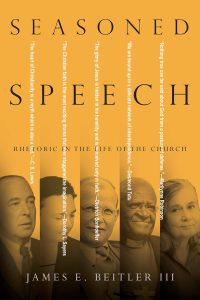 Summary: A look at how five Christians have used rhetoric to impact the church.
Summary: A look at how five Christians have used rhetoric to impact the church.
One of my goals over the next couple of years is to think more clearly about how people’s minds are changed. I purposely say that in the passive voice, because while you can influence the changing of minds, you cannot as an outsider change someone else’s mind. What can be done is to build a relationship, listen, and speak. The how of all three of those does matter.
Seasoned Speech is mainly about the concept of rhetoric, something that I am not sure I have particularly looked into previously. I have had public speaking and preaching classes, but those have been about structure and form more generally than rhetoric.
James Beitler in Seasoned Speech took CS Lewis, Dorothy Sayers, Dietrich Bonhoeffer, Desmond Tutu, and Marilynne Robinson and looked at how they rhetorically communicate their faith. I have read something of all of these authors, although never a full-length book by Tutu and only Sayers’ fiction. Beitler’s chapters on each of these authors focused relatively narrowly. Lewis’ chapter was mostly on speaking in vernacular and knowing the audience and the speaker’s limits. Sayers’ was mostly about using fiction and getting into the story. Bonhoeffer’s chapter was mostly on being prophetic in a way that readers may not want to hear, especially in thining about communicating through sermons. Tutu was using positions and life to communicate (with the illustration of his anti-apartheid work and then later his leadership of the Truth and Reconciliation Commission). This is true of several of the authors being discussed, but especially in the Tutu chapter, the ‘being with’ someone is essential to communicating to them. Robinson challenges the concept of using an argument to compel belief. (It is somewhat ironic that Robinson does use argument in her non-fiction works, but those non-fiction works are far less compelling than her fiction.)
There were places where I disagreed with the advice. And there were places where Beitler noted that the authors had explicitly opposite advice. Seasoned Speech ended with a discussion of ‘speaking in tongues’ in the book of Acts as a metaphor for how we communicate the gospel. His challenge at the end, quoted below, is not that we do not think about rhetoric, but that we are gifted and charged in different ways, so we will use different rhetorical styles and mediums and languages and locations to reach different people. We still need to think about how and why we use rhetoric as we do, but that the using of the different methods and styles is part of what we are designed to do as a body of Christ.
I simply want to affirm the notion that, if the gospel of Jesus Christ is truly to reach the whole world, the church’s witness must go forth in multiple languages, through a variety of mediums, by way of different genres and voices, using a host of rhetorics. It must, in other words, understand the reality of Pentecost not simply in terms of the specific practice of glossolalia but as a rhetorical paradigm for the collective Ä“thos of the whole body of Christ.
View my highlights from the book on Goodreads.
Seasoned Speech: Rhetoric in the Life of the Church by James Beitler Purchase Links: Paperback, Kindle Edition